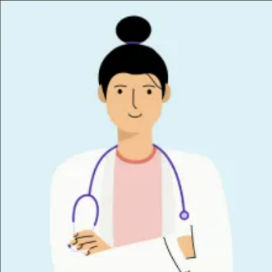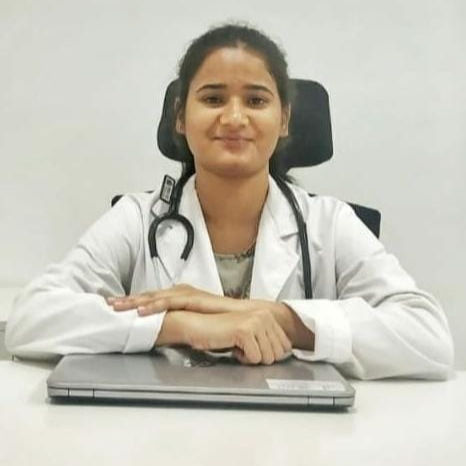Hay Fever Symptoms: Causes, Signs And Treatment Of Hay Fever
Hay fever appears due to allergens and produces symptoms like the common cold. So, learn the symptoms and possible treatment for hay fever.

Written by Dr Shreya Sarkar
Last updated on 3rd Jul, 2025
Hay fever or allergic rhinitis develops symptoms similar to the common cold. But, unlike the cold, hay fever is not caused by viruses. Instead, this allergy appears due to the response to different indoor or outdoor elements which the body identifies as harmful. These elements are known as allergens. Some common allergens that cause hay fever are the pollen and dust mites. Other triggers of hay fever include dander from pets, cockroach droppings, and spores from mould and fungi. However, with effective management and treatment, one can avoid hay fever symptoms. Let's learn about the symptoms and treatment of this disease.
Identifying Symptoms of Hay Fever
People with hay fever experience three types of symptoms:
- Nasal Symptoms: Sneezing, running, and itchy nose
- Eye Symptoms: Itchy, red, watery eyes
- Respiratory Symptoms: Post nasal drip, coughing
Seasonal vs. Perennial Hay Fever
There are two types of hay fever - seasonal and perennial. If a person has seasonal hay fever, they experience symptoms during summer, spring, and early autumn. The seasonal allergens include tree pollen, airborne mould spores, weeds, and grass. They spread through the air and enter the human body through respiratory organs.
Alternatively, some people experience perennial hay fever, which is caused by year-round allergens. These allergens include dust particles, cockroaches, pet hair, or mould. Additionally, hidden food allergies may cause perennial nasal symptoms, but this is a rare case.
How Hay Fever Symptoms Vary with Age
Generally, hay fever symptoms for children and adults follow the same pattern. However, some symptoms may vary between them. The children may experience symptoms like:
- Runny nose
- Itchy and watery eyes
- Sneezing
- Coughing
- Sinus congestion
Symptoms in adults include:
- Runny nose and nasal stuffiness (congestion)
- Sneezing
- Watery, itchy, and red eyes.
- Cough
- Mucus that runs down the back of the throat (postnasal drip)
- Swollen, bruised-appearing skin under the eyes (allergic shiners)
- Itchy nose
- Extreme tiredness and fatigue
Impact of Hay Fever on Daily Life
Patients with hay fever report fatigue, sleeping disorders, and several physical problems. Thus, the disease clearly reduces quality of life, productivity, and cognitive function. As a result, the individual's performance drops at work, school, or home. Hay fever also limits the social interaction of the person, which increases their stress. Resultantly, this condition affects the psychological well-being of the patient.
Diagnosing Hay Fever
Consulting a professional allergist would be the best way to diagnose hay fever symptoms. Initially, the allergist will learn from the patients about their condition and their lifestyle. It will help them predict the cause behind the symptoms. Then, they will review the patient's medical history and check the severity and frequency of the symptoms. Finally, they will recommend a skin test to identify allergens.
The allergy tests include:
- Scratch or prick test: This is the most common allergy test, also known as a percutaneous test. During the test, a small drop of possible allergen is scratched or pricked on the skin. The result is generated within 10-12 minutes.
- Intradermal test: This test is more sensitive than the scratch test. In this test, a small amount of allergen is injected under the skin. After 20 minutes, the injected area is observed to identify any allergic reaction.
Managing and Treating Hay Fever Symptoms
Different options are available for treating hay fever. These include over-the-counter medications, prescription medications, and some home remedies.
The over-the-counter medications include:
- Non-prescription nasal sprays such as budesonide, fluticasone, mometasone, and triamcinolone.
- Oral decongestants such as pseudoephedrine (Sudafed)
- Non-prescription Oral antihistamines include cetirizine, loratadine (Claritin, Alavert), and fexofenadine.
- Eye drops (non-prescription) include ketotifen (Zaditor) and olopatadine (Patanol).
Prescription medications include:
- Nasal sprays containing an antihistamine with a steroid include mometasone, olopatadine (Ryaltris), azelastine, and fluticasone (Dymista).
- Corticosteroid pills such as prednisone.
- Eye drops such as cromolyn sodium.
- Montelukast tablet.
Home remedies include:
- Using shrub butterbur to prevent seasonal allergy symptoms. But it's recommended to use a PA-free product.
- Tinospora cordifolia and spirulina can be used as herbal remedies for hay fever. However, there is limited evidence regarding this.
- Moreover, other herbal remedies with fish oil, honey, capsicum, and vitamin C might be effective.
Long-Term Management Strategies
Individuals should apply lifestyle changes and practise avoiding allergens to manage the disease effectively. Here are some suggestions:
- Pollen (a trigger of allergies) counts remain high in the early morning. Therefore, patients should strictly avoid outdoor activities at this time and during the days with high pollen counts.
- Doors and windows should be closed during the pollen season.
- Pollen easily sticks on the towels and clothes. Thus, hanging garments outside should be avoided.
- They should prefer to stay inside during dry and windy days.
- It is good to use air conditioning inside the house and car.
- Individuals should use sunglasses or regular glasses to prevent pollen from entering their eyes when outside.
- It's highly recommended to wear a mask during house cleaning and gardening.
Moreover, individuals should apply these allergen avoidance techniques:
- Use allergy-proof covers wherever applicable.
- Use the vacuum cleaner with a HEPA filter to vacuum the carpet every week.
- Washing clothes and stuffed animals at least once a week at 130°F.
- If possible, keep the pets outside the home.
- Block the entrances for cockroaches. Swipe out food crumbs from floors.
- Also, people can use allergy-grade filters in the ventilators at home.
- Always use a damp mop to avoid triggering dust during cleaning.
When to Seek Medical Help?
People should consult a healthcare provider in the following situations:
- When they don't get relief from the hay fever symptoms, or the symptoms worsen daily
- When allergy medicines can't provide enough positive outcomes or cause side effects
- If the symptoms are severe
- If hay fever occurs for a whole year
- When the person experiences other medical conditions that worsen hay fever symptoms, such as frequent sinus infections, nasal polyps, or asthma
Also, everyone should be aware of the potential complications of this disease, which helps them to understand the necessity of getting timely treatment. The complications of hay fever include -
- Clogged ears
- Poor sleep
- Decreased sense of smell
- Puffiness under the eyes
- Worsening asthma
Conclusion
Hay fever is a sign of an allergic reaction where the body’s immune system tries to fight foreign elements like dust mites and pollens once they enter through respiratory organs. The symptoms of this condition are similar to those of the common cold, but the intensity levels are comparatively lower. However, not intervening early can lead to complicated respiratory problems. So, everyone should consult a doctor if they experience any symptoms of hay fever. Proper treatment and lifestyle changes can help manage the disease easily.
Consult Top Infectious disease Specialist
Consult Top Infectious disease Specialist

Dr G Prathyusha
General Physician/ Internal Medicine Specialist
5 Years • MBBS DNB (Family medicine), CCEBDM (Diabetology), PGDGM (Geriatrics), Primary care Rheumatologist.
Bengaluru
PRESTIGE SHANTHINIKETAN - SOCIETY CLINIC, Bengaluru

Dr Vishwa Vijeth K.
Pulmonology Respiratory Medicine Specialist
8 Years • MBBS, MD ( Respiratory Medicine)
Bangalore
Apollo Clinic Bellandur, Bangalore

Dr. Krishna Ramanathan
Ent Specialist
10 Years • MBBS DNB
Bengaluru
Apollo Clinic, JP nagar, Bengaluru

Dr. Shruti I
Obstetrician and Gynaecologist
7 Years • MBBS, MS (OBSTETRICS & GYNAECOLOGY)
Bangalore
Apollo Clinic Bellandur, Bangalore

Dr. Pooja
General Physician
3 Years • MBBS
Bengaluru
PRESTIGE SHANTHINIKETAN - SOCIETY CLINIC, Bengaluru